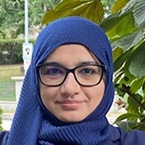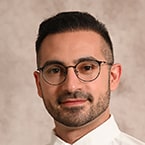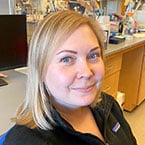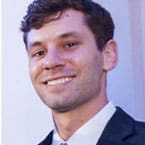AACR-AstraZeneca Cancer Research Fellowships
The AACR-AstraZeneca Cancer Research Fellowships represent a joint effort to encourage and support postdoctoral and clinical research fellows to conduct cancer research and to establish a successful career path in this field. Research projects may be basic, translational, clinical, or epidemiological in nature.
2025 Grantee

Scientific Statement of Research
While immune checkpoint blockade (ICB) has shown promise in deficient mismatch repair endometrial cancer (dMMR EC), only ~40% of patients respond, and resistance is common. Dr. Kabeer aims to expand treatment options by characterizing the expression of antibody-drug conjugate (ADC) targets—including B7-H4, Nectin-4, TROP2, and HER2—using multiplex immunohistochemistry across ~800 molecularly profiled dMMR EC cases. She will be developing patient-derived xenograft (PDX) models from high-expressing tumors to evaluate ADC efficacy, and establishing humanized PDX models from ICB-resistant tumors to study tumor-immune dynamics and test ADC-ICB combinations. This work builds on her prior expertise with ovarian cancer models and aims to define targetable vulnerabilities in dMMR EC.
Biography
Dr. Kabeer is a postdoctoral scientist at the University of British Columbia and BC Cancer, specializing in gynecologic cancer research. She holds an MBBS and practiced as an OB/GYN surgeon before completing an MSc in experimental medicine at McGill University and a PhD in Pathology and Laboratory Medicine at UBC. Her research focuses on tumor heterogeneity, therapeutic resistance, and preclinical modeling in breast and gynecologic cancers. Dr. Kabeer has received national and international funding and is actively involved in translational research aimed at improving outcomes for patients with treatment-resistant cancers.
Acknowledgement of Support
“Receiving the AACR-AstraZeneca Fellowship will support my development as a leading translational scientist in gynecologic oncology. This award will accelerate research into novel therapies for immunotherapy-resistant endometrial cancer and help bridge the gap between bench and bedside, ultimately improving clinical outcomes for patients with limited treatment options.”
2024 GRantees

Research
Emerging evidence suggests that dysregulated gut microbiota may contribute to the development and recurrence of estrogen receptor-positive (ER+) breast cancer (BC). Despite the success of oral endocrine therapies, recurrence remains a risk up to 10 years post-diagnosis. Preliminary data indicate that manipulating the gut microbiome through short-chain fatty acids (SCFAs) may improve treatment outcomes. In mouse models, SCFA supplementation increased tumor-free survival and reduced tumor growth. Additionally, metagenomic sequencing of postmenopausal BC patient samples revealed increases in SCFA-producing microbial species following aromatase inhibitor (AI) treatment. Dr. Arnone aims to explore whether SCFA supplementation can improve the efficacy of oral endocrine therapy using an ER+ bone trophic mouse model. Plasma samples from AI-treated BC patients will also be analyzed to assess AI’s impact on the gut metabolome.
Biography
Dr. Arnone’s graduate work focused on how diet, the gut microbiome, and endocrine therapies influence estrogen receptor-positive breast cancer. She is currently a postdoctoral research fellow in the Department of Cancer Biology at Wake Forest University School of Medicine. She has extensive experience in mammary gland and breast cancer research, particularly the role of the microbiome in breast cancer development. Her current research investigates the potential of microbial-derived metabolites as adjuncts to improve the efficacy of endocrine therapy.
Acknowledgment of Support
“Receiving the 2024 AACR-AstraZeneca Breast Cancer Fellowship for Endocrine Therapy Research will significantly propel my research on gut microbiome manipulation to enhance endocrine therapy efficacy. This support will strengthen my path toward becoming an independent investigator, enabling me to expand translational research that improves outcomes for estrogen receptor-positive breast cancer patients.”

Research
The development of selective kinase inhibitors, particularly for the cyclin dependent kinases (CDK), has been challenging. FDA-approved breast cancer therapies targeting CDK4 (e.g., palbociclib) also target CDK6. However, the neutropenia side-effects limiting the clinical use of CDK4/CDK6 inhibitors are attributed to off-target CDK6 inhibition. Therefore, developing authentic CDK4-selective inhibitors and degraders has been a longstanding goal for the CDK cancer biology field.
Using activity-based protein profiling, Dr. Potter-Engelskirger has identified covalent ligands targeting an isotype-restricted cysteine on CDK4. This liganding event is remarkably selective, with only 8 other cysteines out of 8,000 quantified cysteines showing more than 50% competitive engagement. Among these ligands, he identified one that displayed excellent potency. CDK4 engagement with this molecule leads to the monofunctional degradation of CDK4. Dr. Potter-Engelskirger’s work aims to optimize and understand the mechanism-of-action for allosteric covalent ligands targeting CDK4.
Biography
Dr. Potter-Engelskirger began his training as a chemical biologist in 2015 as a research technician at the Scripps Research Institute. After completing his doctoral training in 2023 at the University of Washington, Dr. Potter-Engelskirger re-joined the Scripps Research Institute as a postdoctoral research associate. At Scripps, Dr. Potter-Engelskirger has combined his interests in protein allostery, chemical proteomics, and covalent ligand discovery to interrogate difficult-to-drug, cancer-relevant protein targets.
Acknowledgment of Support
“The 2024 AACR-AstraZeneca Breast Cancer Fellowship for Endocrine Therapy Research affords me the creative freedom, confidence, and financial support needed to pursue an independent research career. As someone whose family has been directly impacted by cancer, receiving such a distinguished award to support the fight against this disease is extraordinarily meaningful.”

Research
Endometrial cancer (EC) is the most common gynecologic malignancy in the U.S., with poor outcomes for advanced stages due to limited treatment options and high relapse rates. Through single cell RNA sequencing, a unique population of tissue-resident NK (trNK) cells has been identified in EC. TrNK cells express CD200R1, an inhibitory receptor linked to immunosuppression. The CD200R1 ligand (CD200) is also highly expressed in EC. Dr. Youssef hypothesizes that the CD200/CD200R1 axis promotes a dysfunctional, non-cytotoxic trNK phenotype, aiding immune evasion. To explore this, he plans to study the frequency and function of trNK cells and their role in regulating the response to immune checkpoint blockade antibodies.
Biography
Dr. Youssef earned his medical degree from the University Damascus, Syria. He joined The Ohio State University (OSU) in 2014 and investigated cancer immune escape involving NK cells receptors (CD200R1, NKp80 and KIRs). He also investigated extranodal NK/T-cell lymphoma, characterizing its cell of origin. After completing pathology training at OSU in 2018, he transitioned to hematology-oncology to focus on developing novel treatments for hematologic malignancies. He is currently a hematology-oncology fellow in the Physician Scientist Training Program. His long-term goal is to lead a translational research laboratory studying tumor immunity and advancing innovative therapeutic approaches.
Acknowledgment of Support
“The AACR-AstraZeneca Endometrial Cancer Research Fellowship will support my scientific productivity, facilitate first-author publications, and enable exploratory data generation for career development grants. I really appreciate this opportunity and the potential aid of this award in paving my path toward independence and enhancing my potential as a successful physician-scientist.”
2023 Grantees

Research
Hormone receptor positive (HR+) breast cancer patients are usually treated with targeted therapies, including CDK4/6 inhibitors. Despite initial encouraging responses, tumors usually become resistant. In addition to intrinsic resistance that tumors develop, tumor-extrinsic factors, such as cancer-associated fibroblasts residing in the tumor microenvironment, also contribute to treatment-resistance. Dr. Hogstrom seeks to elucidate the function of CAF-secreted metabolites in stimulating treatment resistance to CDK4/6 inhibitors in HR+ breast cancer. To accomplish this, she has established a library of patient-derived organoid cultures and matching cancer-associated fibroblasts from primary and metastatic HR+ breast cancer.
Biography
Dr. Hogstrom received her doctorate at University of Helsinki in Finland, where she studied gene regulation in intestinal stem cells and colorectal cancer. After completing her graduate studies, she joined Beth Israel Deaconess Medical Center as a postdoctoral research fellow. Her research focuses on the metabolic interaction between the breast tumor and tumor microenvironment in HR+ breast cancer.
Acknowledgement of Support
“I’m truly honored to receive the AACR-AstraZeneca Breast Cancer Research Fellowship. This fellowship will help me advance my postdoctoral training in understanding how the tumor microenvironment influences treatment resistance and will be invaluable for my transition from a fellow to an independent investigator.”

Research
The risk of developing most cancers increases with age. Despite over 50% of breast cancer patients being over 60 years old, less than 20% of clinical trial enrollees fall in this age bracket. Further, most preclinical work is performed in young mice. Dr. Spasic’s preliminary data demonstrate that triple negative breast cancer (TNBC) progression and response to chemotherapy (paclitaxel) and immune checkpoint blockade (anti-PD-L1) is distinct between immunologically young and aged mice and is driven by age-associated differences in immune cells. Dr. Spasic proposes to use a novel DNA barcoding system to investigate clonal dynamics to uncover tumor intrinsic drivers of age-associated TNBC progression and manipulate interferon gamma signaling to direct immune cell function to improve responses to therapy.
Biography
Dr. Spasic received his undergraduate degree in bioengineering from the University of California, San Diego in 2012. He then completed his doctorate in 2018 in biomedical engineering at Columbia University, where he studied strategies to promote bone regeneration for the treatment of osteoporosis. Currently, Dr. Spasic is a postdoctoral fellow at Brigham and Women’s Hospital. Dr. Spasic’s research focuses on understanding how age impacts the immune system to dictate breast cancer progression and response to therapy.
Acknowledgement of Support
“Through the incredible support of this fellowship, I will have the ability to continue my work understanding how age impacts triple negative breast cancer progression and response to therapy to help us get closer to improving outcomes for all breast cancer patients.”